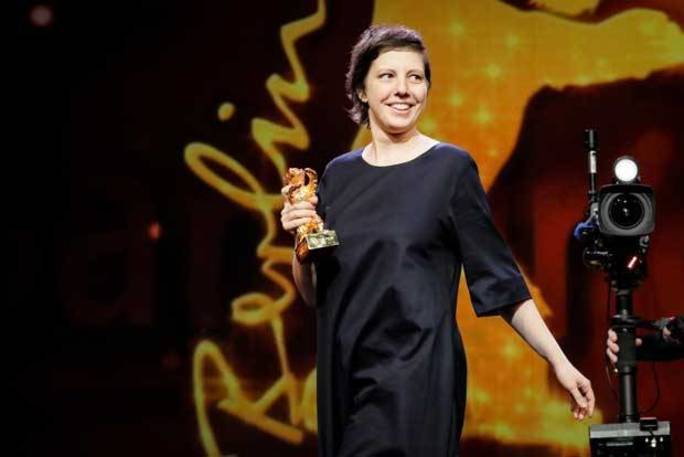


It is a fact that juries of great international festivals follow unpredictable logic. Sometimes it happens because they do not have a vision for the films that are appropriate for the role, and other times it is even for personal or productive implications with authors and works that they are judging. The juries, in short, often end up not awarding the best film.
At the Berlinale [2], the jury’s verdict should be read with political lenses. Awarding a film often becomes a way to make a bold statement, and to highlight an important issue. The verdict of this Berlinale 68, signed by the jury President Tom Twyker [3] (director of "Lola runs" and of the recent acclaimed tv series "Babylon Berlin"), appears totally puzzling. Not one, but two awards were given to one of the more annoying films of the international competition (actually very modest this year), the semi-documentary "Touch Me Not [4]" of the Romanian Adina Pintilie, which - in addition to the Golden Bear - also won the award for the best first feature. It is an experimental film through which the director tries to share the essence of intimacy and pleasure, following some characters with an entomological gaze by exploring their taboos, their trauma, and their perversions. A film characterized by nudity is exhibited without the real ability to provoke. It is an annoying and aestheticizing representation of deformity, and a childish and gross psychoanalytic perspective of the trauma itself. Additionally, the director has a narcissistic need to stand in front of the camera for confessions in which we can never glimpse a bit of truth. Nothing in the film by Pintilie allows us to understand the reasons for such awards.
Unfortunately for the resigning director Dieter Kosslick [5], who is being accused for the lack of valorization of the German movement, will end his direction of the Berlinale with the 2019 edition. The host country’s films won nothing, despite having presented four movies in the competition. At the very least one, specifically, "In der Gängen", by Thomas Stuber, a very inspiring love rising between corridors and forklifts of a hypermarket, was deserving of an important prize. It must be said that the most anticipated of the four, "My Brother's Name Is Robert And He Is an Idiot [6]" by German master Philip Gröning, has been one of the most disappointing and worst works of the entire festival.
Minor prizes have been awarded to much more interesting works. The Special prize of the jury went deservedly to "Twarz [7]" by Małgorzata Szumowska: a caustic portrait of Polish society centering around a young man who receives a face transplant because of an accident at work; Best Director Prize went to Wes Anderson for his "The Isle of Dogs [8]," the opening of the film festival, and an effective political metaphor for the first year of the Trump administration; Double Silver Bear was for the beautiful Paraguayan film "Las Herederas [9]" by the debutant Marcelo Martinessi. It tells the story of an old woman who lived a comfortable life thanks to an inheritance, but later faces crisis when her partner is imprisoned for three months for an unpaid debt. She then finds herself making a living as a taxi driver for her rich neighbors; her new life makes her rediscover her deepest desires. In addition to the best screenplay, the Silver Bear award goes to the extraordinary protagonist Ana Brun who from the stage of the Berlinale dedicated the award to the women of Paraguay whom she called "warriors".
There were no awards for Italy which presented "Daughter of Mine [10]," -Laura Bispuri’s second feature film that does not fully work, and is lacking compared to her debut of "Sworn Virgin" – and Damiano and Fabio D'Innocenzo’s, twin directors, first feature, "Boys Cry [11]:" a slightly presumptuous work set in the problematic suburbs of Rome. It was well shot, but the screenplay was not always up to scratch.
Beyond the prizes, it is difficult to frame this festival. It is a mediocre contest, as mentioned, with very few excellencies. In addition to "Las Herederas", the only other films worthy of mentioning are "Dovlatov [12]" by Aleksej German Jr., and the anomalous anti-musical by Lav Diaz, "Season of the Devil [13]", beautiful and extremely demanding, which is unusual for Berlin, as there is difficulty in recognizing a key theme. Of course, it remains a festival that has the merit of looking with great attention through the films chosen, to the last of the world, to the migratory flows, and to the indigent masses, always choosing a humanistic perspective with which we can only tune. However, the Berlinale, better than other festivals, has always shown itself almost like a big text with a homogeneous meaning where every single film is a chapter. This year it is difficult to reconstruct the pieces among the many themes dealt with, though none that were done in a preponderant way with any provocations, or original perspectives. This too perhaps, is a way of giving a picture of the world that we live in.
Source URL: http://test.iitaly.org/magazine/focus/art-culture/article/berlin-film-festival-68-some-considerations
Links
[1] http://test.iitaly.org/files/pintillie1519581927jpg
[2] https://www.berlinale.de/
[3] https://en.wikipedia.org/wiki/Tom_Tykwer
[4] http://www.imdb.com/title/tt4949112/
[5] https://en.wikipedia.org/wiki/Dieter_Kosslick
[6] http://variety.com/2018/film/reviews/my-brothers-name-is-robert-and-he-is-an-idiot-review-berlinale-2018-1202706298/
[7] http://www.filmweb.pl/film/Twarz-2017-754841
[8] http://www.imdb.com/title/tt5104604/
[9] http://www.imdb.com/title/tt7875464/
[10] http://variety.com/2018/film/news/berlin-italian-director-laura-bispuri-daughter-of-mine-motherhood-modernity-1202693405/
[11] https://www.hollywoodreporter.com/review/boys-cry-la-terra-dellabbastanza-1086210
[12] https://en.wikipedia.org/wiki/Dovlatov_(film)
[13] https://en.wikipedia.org/wiki/Season_of_the_Devil